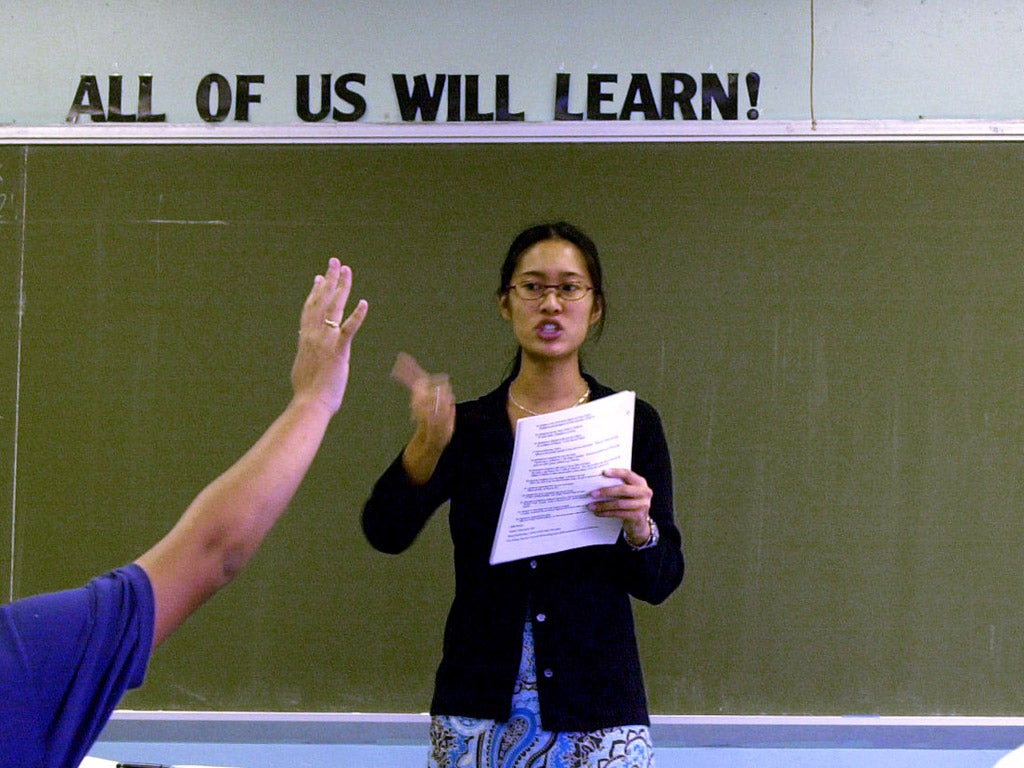Michael Gove's tougher teacher training tests won't solve the problem of teachers who can't spell
Michael Gove has announced that trainee teachers are to face tougher tests, after branding current exams too easy.


Last week we learned that, from here on, trainee teachers will be expected to be able to read and write accurately and are able to manage basic maths.
Yes, that’s right. I’ll spell it out again in case you think you’re dreaming or have misunderstood. At present, the implication is, having done GCSE, A levels and a degree, a worrying number of the people we put in charge of educating the nation’s young have inadequate levels of literary and numeracy.
If ever anyone was wondering what was really wrong with the state education system, here it is in a nutshell. Too many of our ‘trained’ and ‘qualified’ teachers are unable to write coherently with accurate spelling, grammar and punctuation and/or to add up a column of figures or work out the area of a rectangle.
Such is the lack of faith in our corrupt examination system that for some years now, aspirant teachers armed with their 5 A*-C grades including English and maths – not to mention those ‘gold standard’ A levels - have been compelled to take additional literacy and numeracy tests. They were expected to pass at least the equivalent of GCSE grade C or D. One in five trainees fails one or other subject and one in 10 takes the maths test three times or more, although Coalition reforms have recently proscribed more than two re-takes.
But now – you’ll be relieved to hear – new ‘tougher’ tests are being introduced which, of course, begs the question that surely anyone wanting to be a teacher should already be so well educated that no further test of the basics is needed?
The new tests, gulp, expect these trainees to pass at the equivalent of Grade B – not, please note, A* or A. Well I taught GCSE English for years and, although I was naturally delighted when my borderline candidates surpassed the Grade C threshold to get a B, these were not people fully at ease with the subject and hardly the sort you’d want to be teaching it to children five years later. I’ve never taught maths but I bet the same applies.
It isn’t new. I attended an old fashioned primary school and then a good girls’ grammar school in South London. Literacy and numeracy were an undiscussed given – for everybody. Imagine my amazement when I started teaching in a nearby boys’ comprehensive at being asked by a young colleague when we were all marking exams: ‘Do you know how to do percentages? Could you help me with mine?’
Years later, as Head of English, I was put in charge (by the literate, worried head) of checking all letters written by colleagues to parents and outside organisations because so few of them could be relied upon to write error-free English. And as for reading through staff reports on pupils when I was Head of Upper School, I used routinely to return around 25% to the writer because of spelling mistakes (‘conscientious’ and ‘disappoint’ were commonly misspelt). Grammar and punctuation errors abounded too.
It isn’t exclusive to state schools either. I worked for a while in one of the most expensive and famous schools in Britain. At the end of every term, when reports were looming, the deputy head would always ‘respectfully’ remind colleagues that ‘a good term’s work’ requires an apostrophe.
As a journalist I now go into lots of schools. And – as someone who has worked one way or another with words for an entire career – I have an eagle eye. Errors on, say notice boards tend to leap out at me. ‘Sentance’ (sic) is a common misapprehension. So is the run on comma when full stops are the correct form of punctuation. I also see a lot of sloppy grammar. ‘Mr Jones and I will meet you at 12.00’ or ‘Cancelling today, drama workshop will start again next week.’
I’ve often seen spelling and other mistakes in teachers’ hand written comments on pupils’ work too – both as a colleague and parent.
Are we really to believe that all this will now stop because trainee teachers have to take a test which – if only school curricula and exams were suitably rigorous would (should?) be completely unnecessary – shows they can write a little essay at GCSE Grade B level?
"There are now too few properly educated people to teach the next generation"
All teachers should be effortlessly and fluently at ease with the language which underpins everything they do. There used to be a mantra that ‘Every teacher is teacher of English.’ If only. Back at my grammar school every single member of staff would correct errors in English in our written work. They didn’t take the – now all too common - view that if you teach, say, science or geography, English isn’t your responsibility. I clearly remember being made to get words such as ‘isosceles’ ‘volcanoes’ and ‘gaseous’ right - in context.
If we are ever to get back to that then we need more than a few banal, bolt-on tests at GCSE Grade B. English (and maths) needs to be taught rigorously right the way through school by people who really can get it right.
The trouble is that there are now too few properly educated people to teach the next generation. So we’re trapped in a downward spiral. And teaching in Britain has, for many, always tended to be something you do if you can’t do anything else. It no longer attracts enough of the very best graduates.
That’s the problem Gove and his colleagues should really be seeking solutions for. The new tests are the equivalent of trying to cure measles by scratching off the spots.
Join our commenting forum
Join thought-provoking conversations, follow other Independent readers and see their replies
Comments
Bookmark popover
Removed from bookmarks